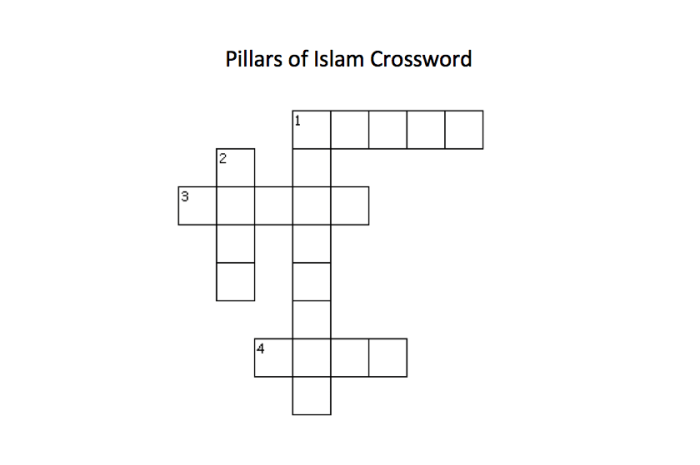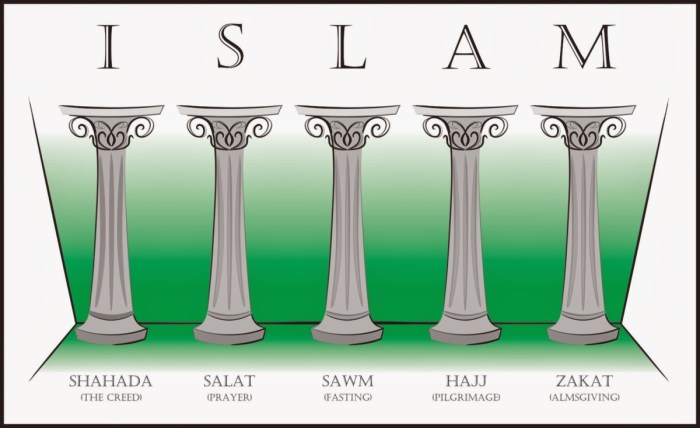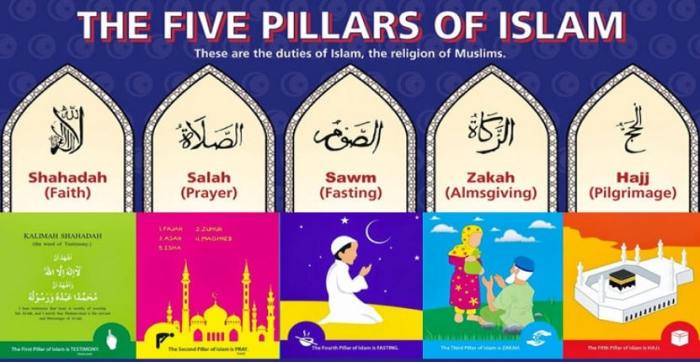Embark on an intellectual journey into the captivating realm of religion with five pillars crossword, where we unravel the profound essence of faith and its multifaceted manifestations. This comprehensive exploration delves into the historical origins, cultural impact, and contemporary relevance of these foundational principles that shape religious practices worldwide.
Our investigation commences with a thorough examination of the concept of religion, its multifaceted nature, and the pivotal role of the five pillars in shaping religious beliefs and practices. We trace the historical evolution of these pillars, shedding light on their origins and the profound influence they have exerted on cultural traditions, societal values, and norms.
Religion: Five Pillars Crossword

Religion is a complex and multifaceted concept that has played a significant role in human societies throughout history. It encompasses beliefs, practices, and rituals that provide a framework for understanding the world and one’s place within it. One of the most common ways to categorize religions is by their adherence to the five pillars, a set of core principles that guide religious practice and belief.
The five pillars are a central concept in many religions, including Islam, Judaism, Christianity, and Buddhism. They provide a foundation for religious observance and ethical behavior, shaping the way that adherents live their lives and interact with the world around them.
Historical Origins and Cultural Impact
The historical origins of the five pillars can be traced back to ancient religious traditions. In Islam, the five pillars are believed to have been revealed to the Prophet Muhammad by God through the angel Gabriel. In Judaism, the five pillars are based on the Torah, the sacred text of the Jewish people.
In Christianity, the five pillars are derived from the teachings of Jesus Christ as recorded in the New Testament. In Buddhism, the five pillars are known as the Five Precepts, which are fundamental ethical guidelines for followers.
The five pillars have had a profound impact on the cultural traditions and beliefs of societies around the world. They have shaped religious architecture, art, music, and literature. They have also influenced societal values and norms, promoting virtues such as compassion, charity, and justice.
Crossword Puzzle Analysis
Crossword puzzles can be a valuable tool for understanding religion. They can help to reinforce knowledge of religious concepts and terminology, and they can also provide insights into the different ways that religions interpret and implement the five pillars.
Here is a crossword puzzle that incorporates clues related to the five pillars:
- Across
- 1. The first pillar of Islam (5 letters)- FAITH
- 3. The second pillar of Islam (5 letters) – PRAYER
- 5. The third pillar of Islam (7 letters) – FASTING
- 7. The fourth pillar of Islam (8 letters) – ALMSGIVING
- 9. The fifth pillar of Islam (10 letters) – PILGRIMAGE
- Down
- 1. The first pillar of Judaism (6 letters)- BELIEF
- 2. The second pillar of Judaism (7 letters) – PRAYER
- 4. The third pillar of Judaism (9 letters) – STUDY
- 6. The fourth pillar of Judaism (8 letters) – CHARITY
- 8. The fifth pillar of Judaism (10 letters) – REPENTANCE
Comparative Analysis of Religions
Different religions interpret and implement the five pillars in different ways. For example, in Islam, the five pillars are considered to be obligatory duties for all Muslims. In Judaism, the five pillars are seen as guidelines for ethical behavior, but they are not considered to be mandatory.
In Christianity, the five pillars are seen as important principles for living a Christian life, but they are not considered to be essential for salvation.
These variations in interpretation and implementation have implications for interfaith dialogue and understanding. It is important to be aware of the different ways that religions understand and practice the five pillars in order to avoid misunderstandings and promote respectful dialogue.
Contemporary Relevance and Future Implications, Religion with five pillars crossword
The five pillars continue to be relevant in modern society. They provide a framework for religious practice and ethical behavior in a rapidly changing world. However, there are also challenges to adhering to the five pillars in the 21st century.
One challenge is the increasing secularization of society. In many parts of the world, people are becoming less religious and less likely to identify with a particular religion. This can make it difficult for religious communities to maintain their traditions and practices.
Another challenge is the rise of religious extremism. In some parts of the world, religious extremists have used the five pillars to justify violence and intolerance. This has led to a negative perception of religion in some quarters.
Despite these challenges, the five pillars continue to be an important part of religious practice for many people around the world. They provide a framework for living a meaningful and ethical life, and they can help to promote peace and understanding between different religious communities.
Top FAQs: Religion With Five Pillars Crossword
What is the significance of the five pillars in religion?
The five pillars serve as fundamental principles that define and guide religious practices, providing a framework for worship, ethical conduct, and spiritual growth.
How have the five pillars shaped cultural traditions and beliefs?
The five pillars have profoundly influenced cultural traditions, shaping art, architecture, music, and literature, while also influencing societal values, norms, and legal systems.
What are the benefits of using crossword puzzles to understand religion?
Crossword puzzles provide an engaging and interactive way to learn about religious concepts, fostering critical thinking, problem-solving skills, and a deeper understanding of different faiths.

